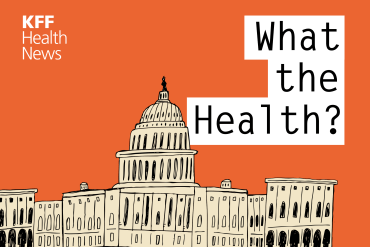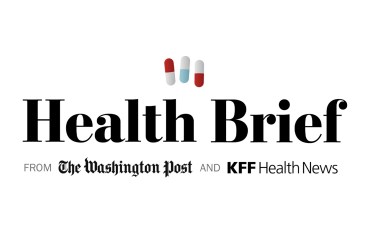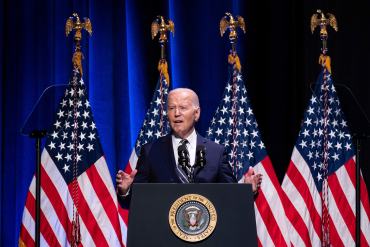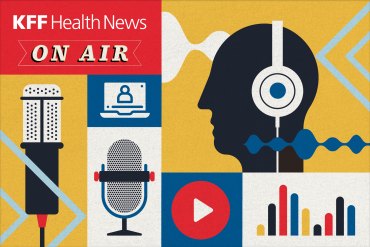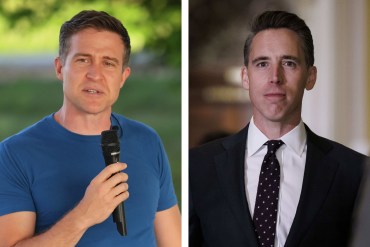KFF Health News' 'What the Health?': SCOTUS Ruling Strips Power From Federal Health Agencies
In what will certainly be remembered as a landmark decision, the Supreme Court has overruled a 40-year-old precedent that gave federal agencies, rather than judges, the power to interpret ambiguous laws passed by Congress. Administrative experts say the decision will dramatically change the way key health agencies do business. Also, the court decided not to decide whether a federal law requiring hospitals to provide emergency care overrides Idaho’s near-total ban on abortion. Alice Miranda Ollstein of Politico, Victoria Knight of Axios, and Joanne Kenen of Johns Hopkins University and Politico Magazine join KFF Health News chief Washington correspondent Julie Rovner to discuss these stories and more. Plus, for “extra credit,” the panelists suggest health policy stories they read this week they think you should read, too.
1st Biden-Trump Debate of 2024: What They Got Wrong, and Right
A debate marked by President Joe Biden’s faltering performance featured clashes over insulin costs, inflation, abortion, immigration, and Jan. 6.
Abortion Ballot Measures Won’t Automatically Undo Existing Laws
On Tuesday, a judge in Michigan blocked some of the state’s lingering restrictions on abortion access, including a mandatory 24-hour waiting period. The ruling comes 19 months after voters added abortion rights to the state constitution in November 2022. Michigan was one of the first states to protect abortion access at the ballot box after […]
Republicans Are Downplaying Abortion, but It Keeps Coming Up
Torn between a base that wants more restrictions on reproductive health care and a moderate majority that does not, it seems many Republicans would rather take an off-ramp than a victory lap when it comes to abortion. But they can’t escape talking about it.
Battleground Wisconsin: Voters Feel Nickel-and-Dimed by Health Care Costs
In the swing state of Wisconsin, the cost and availability of health care have emerged as key issues. Voters there say prescriptions, procedures, and health insurance policies are too expensive, and must be addressed by the next president, whether Republican or Democrat.
Rate of Young Women Getting Sterilized Doubled After ‘Roe’ Was Overturned
A recent study found that the rate of women 18 to 30 getting tubal ligations doubled in the 16 months following the Dobbs decision. The number of young men getting vasectomies also shot up, but men still get sterilized much less often than women.
KFF Health News' 'What the Health?': Live From Aspen: Health and the 2024 Elections
Health policy may not be the top issue in this year’s presidential and congressional elections, but it’s likely to play a key role. President Joe Biden and Democrats intend to hold Republicans responsible for the Supreme Court’s unpopular ruling overturning the right to abortion, and former President Donald Trump aims to take credit for government efforts to lower prescription drug prices — even in cases in which he played no role. Meanwhile, some critical health care issues, such as those involving Medicaid and the Affordable Care Act, are unlikely to get discussed much, even though the party in power after the elections would control the future of those programs. This week, in an episode taped before a live audience at the Aspen Ideas: Health festival in Aspen, Colorado, Margot Sanger-Katz of The New York Times and Sandhya Raman of CQ Roll Call join KFF Health News’ Julie Rovner to discuss these issues and more.
Presidential Politics, Polka and Wisconsin
Wisconsin, the land of fried cheese curds and the Green Bay Packers, is one of a half-dozen key battleground states where President Biden is trying to make health care a key issue in his expected November matchup with former president Donald Trump. Biden narrowly won Wisconsin in 2020, after it went for Trump in 2016. […]
KFF Health News' 'What the Health?': SCOTUS Rejects Abortion Pill Challenge — For Now
The Supreme Court has dismissed a challenge to the FDA’s approval of the abortion pill mifepristone, ruling unanimously that the anti-abortion doctor group that filed the suit lacked standing. But abortion opponents are expected to pursue other strategies to ban or restrict the medication. Meanwhile, the Biden administration moves to stop the inclusion of medical debt on individual credit reports, and former President Donald Trump tries to claim credit for $35 insulin. Anna Edney of Bloomberg News, Rachana Pradhan of KFF Health News, and Emmarie Huetteman of KFF Health News join KFF Health News chief Washington correspondent Julie Rovner to discuss these stories and more. Also this week, Rovner interviews KFF president and CEO Drew Altman about KFF’s new “Health Policy 101” primer.
Biden’s on Target About What Repealing ACA Would Mean for Preexisting Condition Protections
A Biden campaign ad highlighting how an Obamacare repeal would affect people with preexisting conditions is mostly true.
Wins at the Ballot Box for Abortion Rights Still Mean Court Battles for Access
Michigan and Ohio serve as cautionary tales for states whose voters will decide abortion ballot initiatives this year: Even if the measures pass, it would take time to unwind conflicting laws.
Presidential Election Could Decide Fate of Extra Obamacare Subsidies
Most states that saw enrollment in the Obamacare marketplace double from 2020 to 2024 are in the South. But the enhanced federal subsidies that attracted people with $0 premiums and low out-of-pocket costs will expire next year.
KFF Health News' 'What the Health?': Anti-Abortion Hard-Liners Speak Up
While Republican candidates in many states downplay their opposition to abortion, the most vehement wing of the movement, which helped overturn Roe v. Wade — those who advocate prosecuting patients, outlawing contraception, and banning IVF — are increasingly outspoken. Meanwhile, some state legislatures continue to advance new restrictions, like a proposal moving in Louisiana to include abortion medications mifepristone and misoprostol on the list of the most dangerous drugs. Alice Miranda Ollstein of Politico, Rachel Roubein of The Washington Post, and Joanne Kenen of the Johns Hopkins schools of public health and nursing and Politico Magazine join KFF Health News’ Julie Rovner to discuss these stories and more. Also this week, Rovner interviews Shefali Luthra of The 19th about her new book on abortion in post-Roe America, “Undue Burden.”
Biden Leans Into Health Care, Asking Voters To Trust Him Over Trump
President Joe Biden’s new health care ad draws on the Affordable Care Act’s popularity among independent voters and alludes to his edge over Trump on health issues.
Journalists Demystify Bird Flu, Brain Worms, and New Staffing Mandates for Nursing Homes
KFF Health News and California Healthline staff made the rounds on national and local media in recent weeks to discuss topical stories. Here’s a collection of their appearances.
Democrats Seek To Make GOP Pay for Threats to Reproductive Rights
Democrats running for office are using abortion rollbacks to galvanize voters, with abortion rights ballot initiatives amplifying their lines of attack. In Missouri, the leading Democratic candidate for the Senate also blames Republican Sen. Josh Hawley for threatening access to IVF.
Robert F. Kennedy Jr. Is Wrong About a Ban on NIH Research About Mass Shootings
Since 2020, the National Institutes of Health and other federal agencies have collectively funded millions of dollars in gun-related research, including studies addressing mass shootings.
KFF Health News' 'What the Health?': Abortion — Again — At the Supreme Court
For the second time in as many months, the Supreme Court heard arguments in an abortion case. This time, the justices are being asked to decide whether a federal law that requires emergency care in hospitals can trump Idaho’s near-total abortion ban. Meanwhile, the federal government, for the first time, will require minimum staffing standards for nursing homes. Alice Miranda Ollstein of Politico, Tami Luhby of CNN, and Joanne Kenen of Johns Hopkins University and Politico Magazine join KFF Health News’ Julie Rovner to discuss these stories and more. Plus, for “extra credit,” the panelists suggest health policy stories they read this week they think you should read, too.
KFF Health News' 'What the Health?': Too Big To Fail? Now It’s ‘Too Big To Hack’
Congress this week had the chance to formally air grievances over the cascading consequences of the Change Healthcare cyberattack, and lawmakers from both major parties agreed on one culprit: consolidation in health care. Plus, about a year after states began stripping people from their Medicaid rolls, a new survey shows nearly a quarter of adults who were disenrolled are now uninsured. Jessie Hellmann of CQ Roll Call, Sarah Karlin-Smith of the Pink Sheet, and Lauren Weber of The Washington Post join KFF Health News’ Mary Agnes Carey to discuss these stories and more. Also this week, KFF Health News’ Julie Rovner interviews Caroline Pearson of the Peterson Health Technology Institute.
KFF Health News' 'What the Health?': Arizona Turns Back the Clock on Abortion Access
A week after the Florida Supreme Court said the state could enforce an abortion ban passed in 2023, the Arizona Supreme Court ruled that state could enforce a near-total ban passed in 1864 — over a half-century before Arizona became a state. The move further scrambled the abortion issue for Republicans and posed an immediate quandary for former President Donald Trump, who has been seeking an elusive middle ground in the polarized debate. Alice Miranda Ollstein of Politico, Rachel Cohrs Zhang of Stat, and Rachel Roubein of The Washington Post join KFF Health News’ Julie Rovner to discuss these stories and more. Also this week, Rovner interviews KFF Health News’ Molly Castle Work, who reported and wrote the latest KFF Health News-NPR “Bill of the Month” feature, about an air-ambulance ride for an infant with RSV that his insurer deemed not medically necessary.


